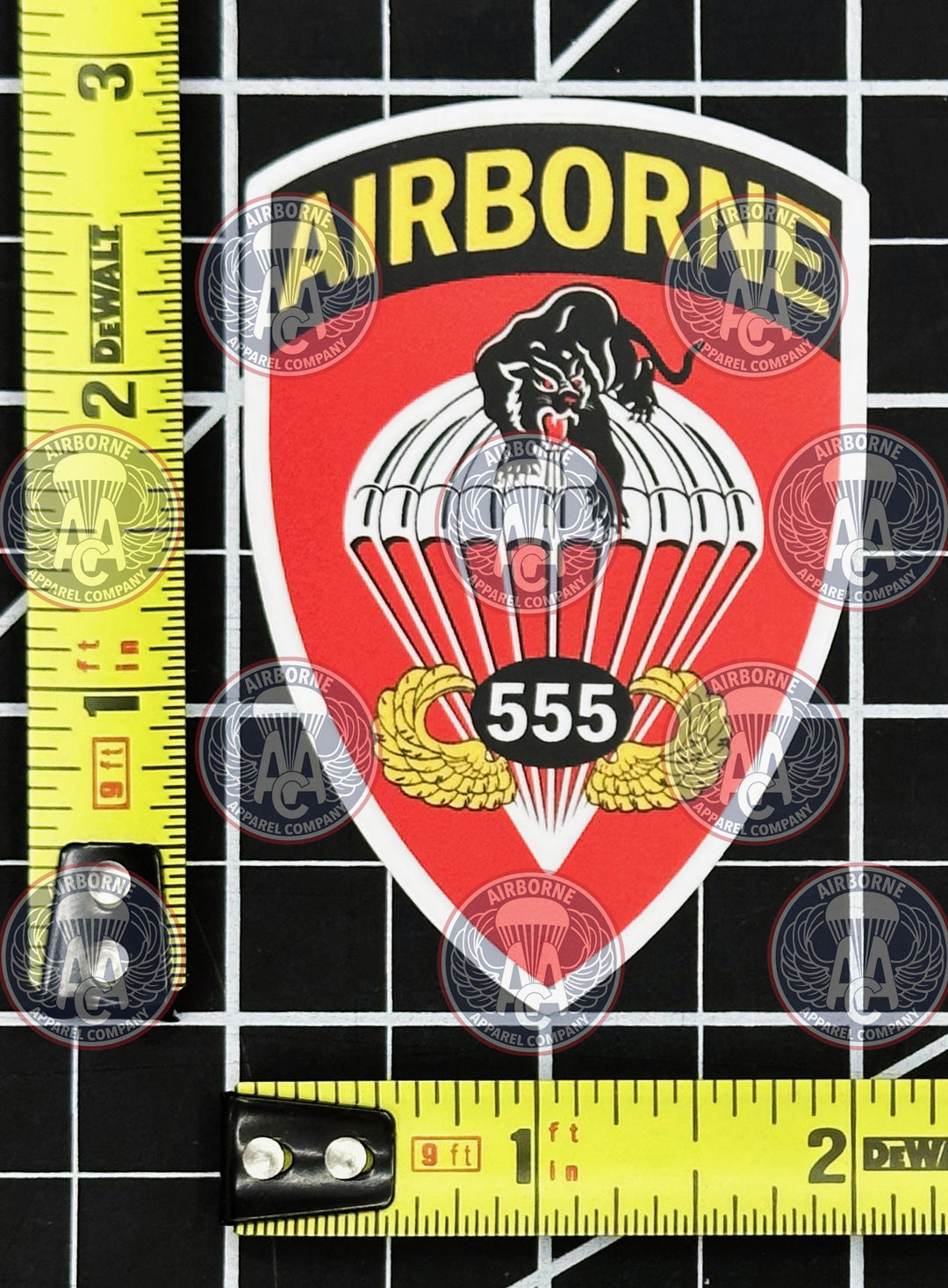The 555th Parachute Infantry Battalion (PIB), historically known as the "Triple Nickles," holds a unique and pioneering place in U.S. Army history as the nation's first all-Black paratrooper unit during a time of military segregation. Activated in 1943 at Fort Benning, GA, the Triple Nickles volunteered for elite airborne training despite facing intense racial prejudice. Though denied a combat role in Europe, the unit executed a highly classified domestic mission during World War II known as Operation Firefly (1945), where they were stationed in the Pacific Northwest to combat wildfires and defuse Japanese balloon bombs, effectively becoming the first military smokejumpers and pioneering techniques still used today. After the war, the battalion was famously absorbed by the 82nd Airborne Division in 1947, directly preceding the military's official desegregation and paving the way for African-Americans in the airborne community. The unit is INACTIVE today, but its lineage and legacy are celebrated as a monumental civil rights milestone in military history.
The history of the 555th Parachute Infantry Battalion (PIB) is a story of determination and pioneering spirit in the face of institutional segregation. Following recommendations to integrate African-American soldiers into combat and elite units, the War Department authorized the formation of an all-Black parachute unit. The core unit, the 555th Parachute Infantry Company, was officially activated on December 30, 1943, at Fort Benning, GA, with a cadre of volunteers primarily drawn from the 92nd Infantry Division ("Buffalo Soldiers"). The unit quickly adopted the nickname "Triple Nickles," a reference to the battalion's number (555) and the Buffalo nickel, an early U.S. coin.
The soldiers, including pioneering figures like First Sergeant Walter Morris, endured exceptionally demanding airborne training at Fort Benning and later at Camp Mackall, NC, often facing skepticism and prejudice from their contemporaries who doubted their physical and mental capability. The success of the initial volunteers shattered racial barriers in the elite airborne community. By November 1944, the company was reorganized and expanded into the full 555th Parachute Infantry Battalion.
World War II: Operation Firefly – The Smokejumpers
As World War II drew to a close, the Triple Nickles were alerted for an overseas deployment that never materialized. Instead, in May 1945, the battalion was transferred to Pendleton Field, Oregon, for a top-secret domestic mission known as Operation Firefly.
This mission was in response to a Japanese strategic weapon: balloon bombs carrying incendiary devices that floated on the jet stream across the Pacific, intended to cause massive wildfires and civilian panic in the U.S. West Coast. The 555th PIB was tasked with a dual mission: bomb disposal (locating and defusing unexploded balloon bombs) and wildland firefighting.
Working jointly with the U.S. Forest Service, the Triple Nickles underwent rigorous training to become airborne firefighters, or "smokejumpers"—learning to parachute safely into dense, remote timber areas using specialized gear, including a 150-foot rope to descend from trees. From May to October 1945, the 555th performed over 1,200 individual jumps and fought 36 fires across the Pacific Northwest, spanning seven states and one Canadian province. This operation marked the first use of paratroopers as smokejumpers by the military. Tragically, Private First Class Malvin L. Brown, a battalion medic, became the unit's only fatality, making him the first military smokejumper killed in the line of duty.
Legacy and Integration
After Operation Firefly, the 555th PIB returned to Fort Bragg, NC. In a key step toward desegregation in the U.S. military—a full year before President Harry S. Truman’s Executive Order 9981 officially ended racial segregation in the armed forces—the 555th Parachute Infantry Battalion was inactivated on December 15, 1947. Its personnel were immediately and entirely integrated into the 3rd Battalion, 505th Parachute Infantry Regiment of the 82nd Airborne Division. This historic transfer made the 3rd Battalion, 505th PIR the first fully integrated combat unit in the U.S. Army.
Following the Korean War, many former "Triple Nickles" volunteered to form the 2nd Ranger Infantry Company (Airborne), the first all-Black Ranger unit, which conducted the first combat jump by a U.S. Army Ranger company at Munsan-ni in 1951.
Current Status (Inactive)
The lineage of the 555th Parachute Infantry Battalion is INACTIVE. The unit was officially disbanded and removed from Army rolls on August 22, 1950. However, the legacy of the "Triple Nickles" continues to be honored through memorials at Fort Bragg, NC, and Fort Benning, GA, and through the active 555th Parachute Infantry Association, which celebrates the unit’s pioneering achievements in both civil rights and airborne tactics.
Airborne Apparel Company is proud to offer reproductions and unique designs that celebrate the 555th Parachute Infantry Battalion ("Triple Nickles") legacy.






